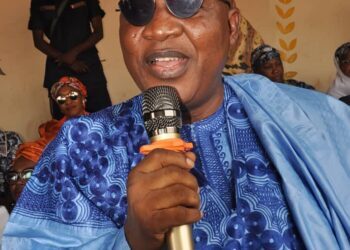By Gambo Jagindi
Call him a child of destiny, a humanitarian, or a pillar of the masses, and you wouldn’t be far from the truth. Honorable Daniel Amos, representing Jema’a/Sanga Federal Constituency in the House of Representatives, has revolutionized the lives of countless citizens in his constituency and community .
Rising from a remote village of Kogum Dutse in Jema,a Local government area of Kaduna State with no motorable road, Amos has defied the odds to become a beacon of hope for his people. In a remarkable display of determination and leadership, he has single-handedly facilitated the construction of a motorable road, connecting his village to the rest of the world.
But that’s not all – Amos has also successfully influenced the establishment of a federal technical school in his community, which is currently under construction. This project is expected to provide skills training and employment opportunities for countless youth, empowering them to build a brighter future.
These achievements, accomplished in under two years, are a testament to Amos’s unwavering commitment to transforming the lives of his constituents. His selfless service and dedication to community development have earned him a reputation as a champion of progress and a true leader.
He has achieved the impossible – surpassing the achievements of his predecessor at the National Assembly in just two years. His passion for community development and empowerment dates back to his days as a church and community youth leader, demonstrating his commitment to improving lives .
His impressive achievements have earned him widespread recognition and accolades from esteemed organizations such as the Gwandara Educational Development and Cultural Association (GWADECA) and the Southern Kaduna People Union (SOKAPU).
Amos’s commitment to enhancing the lives of his constituents is evident in his genuine efforts to *Mitigate Insecurity*, *Promote Peaceful Coexistence*, and *Foster Unity* among the people of his constituency. His dedication to these causes has resonated with various tribal groups, who have also recognized his outstanding contributions.
This transformative leadership has also been commended by stakeholders, who praised his outstanding acts of kindness and generosity. He has empowered numerous individuals, including women and youth, through various initiatives and programs .
Dan, as fondly called by friends, has made a profound impact on his constituency, transforming the lives of countless families. By staying true to his campaign promises, he has secured permanent and pensionable appointments for many in various federal government ministries, agencies, and parastatals. This remarkable achievement has brought financial stability to numerous families, demonstrating Dan’s commitment to improving the well-being of his constituents .
Also his commitment to empowering his constituents is evident in his provision of business capital to thousands, eye surgery to over 300 individuals, and agricultural support to more than a thousand people. His efforts to address unemployment have also yielded impressive results, with several youth recruited into the Nigerian police and other security agencies through his influence.
With his impressive track record, Amos has proven himself to be a dedicated and effective leader in the National Assembly. His ability to attract numerous projects to his constituency, fearlessly advocating for the rights of his people,
has further demonstrated his capabilities as a representative of his people.
As a champion of the people, Honorable Daniel Amos continues to inspire hope and confidence in his constituents. His selfless service and dedication to the well-being of his community are truly commendable, and his legacy as a transformative leader will be remembered for generations to come.
Jagindi is a publisher and a public affairs analyst writes from Abuja, via jagindi2016@gmail.com, +2347065466654











